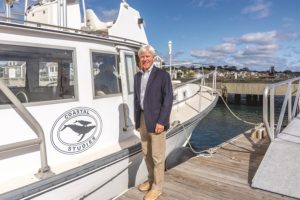PROVINCETOWN — Center for Coastal Studies CEO Rich Delaney may sit in the driver’s seat of a small nonprofit working to save the whales in Provincetown, but he has a global role in setting policies that can help save the world.
The United Nations Climate Change Conference begins in Glasgow, Scotland on Oct. 31. The two-week event brings together the leaders of 197 countries who will negotiate climate mitigation measures, including reduction of greenhouse gas emissions. The U.S. will send President Joe Biden; former Senator and Secretary of State John Kerry, who is now the first special presidential envoy for climate; and 13 cabinet secretaries. Delaney will be there, too, as co-founder and board president of the nonprofit Global Ocean Forum.

His organization will set up a pavilion with dozens of others just outside the inner beehive of diplomatic activity. It is hard to imagine what such an event, with thousands of high-level dignitaries, even looks like. Delaney explained in a recent interview that the complex is massive. Within it, there is a sort of inner circle. The diplomats will be in a huge room “similar to what people envision at the U.N., with desks in the round and all the interpreters,” he said.
Outside this political nucleus, in the compound set up for the conference, there will be pavilions with organizations holding seminars and lectures on their specific topics. Indigenous peoples, who are disproportionately affected by climate change, will have a pavilion, as will the small islands “who are not only threatened but may disappear” because of sea level rise, Delaney said. Private industry, including Fortune 500 energy companies, will have pavilions, too. This speaks to the fact that green energy is the profit-making path of the future, Delaney said.
And then there will be Delaney’s Global Ocean Forum.
When it started in 2001, Delaney was able to get the Forum certified as a nongovernmental organization. This certification enables the group to attend the conference at a higher level than most. Aside from the U.N. delegates themselves and the news media, NGOs fall into the last allowable category of participants known as observer organizations.
“We get to be in the building,” he said. “We don’t sit in on the negotiations, but we attend some of the hearings. That is the platform we use to be close enough to the negotiators to influence them.”
The Global Ocean Forum achieved a major goal in Paris, in 2015, when the U.N. conference adopted language recognizing the importance of ocean health in the overall well-being of the planet. Before that, Delaney said, he and others were “flabbergasted” by the lack of recognition in the ocean’s critical role in climate change.
“It still baffles me,” he said.
How Important Are Oceans?
Phytoplankton, microscopic plants at the surface of the water, produce 60 to 70 percent of the oxygen in the atmosphere, Delaney said.
When Delaney’s group formed, climate change was a fringe issue. Today it’s a “global priority,” according to the UN climate change conference literature. Delaney has ridden the wave up to this conference, where the stage is now set to either advance the goals recommended by climate scientists or not.
Each of the participating nations in the Glasgow arena have a “nationally determined contribution” or overall benchmark to improve global climate health. Currently, these goals are voluntary, but the aim of this convention is to move toward more ambitious and, ideally, more enforceable commitments, Delaney said. The U.S., for example, has pledged to reduce net greenhouse gas emissions by 50 to 52 percent below the 2005 level by 2030, according to the United Nations Framework Convention on Climate.
This will be hard to do, however, without Congress passing an infrastructure bill containing climate-conscious policies. Congress has set a goal of voting on it by Oct. 31, the day the U.N. conference begins. All eyes are on West Virginia Sen. Joe Manchin and Arizona Sen. Kyrsten Sinema, two Democrats who are currently at an impasse with the rest of the Democratic senators.
“The infrastructure bill is critical,” Delaney said. “And if the two senators for unexplainable reasons hold up passage of that bill along with the Republicans, all of whom are opposing it, it will be incredibly irresponsible. The whole world is waiting for the U.S. to resume its leadership role after five years missing in action with Trump, and if two people end up killing it, it will be a tragedy.”
But, Delaney added, even if that happens, the Biden administration will still be able to use administrative and executive actions without Congress. Pete Buttigieg, the secretary of transportation, can make public transportation a higher priority, and Environmental Protection Agency Administrator Michael Regan will be able to impose regulations to control emissions from coal-fired power plants, Delaney said.
Locally, what can be done? Delaney came back from the 2015 U.N. Climate Conference and, with other local activists, founded the Cape Cod Climate Change Collaborative. That nonprofit has met annually and will hold its signature event on Oct. 29. The free “Net Zero 2021: Powering Change at the Grassroots Level” conference will be virtual. Green energy methods that consumers can use are on the agenda, which can be found at netzerocapecod.org.
Delaney will deliver opening and closing remarks at the Net Zero event. A couple of days later, he will get on a plane for Glasgow.



